
Freedom News Freedom News writes and shares posts that are of Interest to a broad demographic . Articles are to be taken on a individual basis and not under the assumption that different Authors and content providers and Horwich Nationalist as well share the same opinions. Articles copied are fully attributed to Authors under international fair use acts. .
Search This Blog
FREEDOM NEWS HOME PAGE
Wednesday, 26 October 2022
White Slums of South Africa | Reggie Yates Extreme | Real Stories
feminist in their hatred of Men and the family and Christianity become lonely
feminist in their hatred of Men and the family and Christianity become lonely
Many feminist in their hatred of Men and the family and Christianity often quote << Ephesians 5 >> "vs22 Wives, submit yourselves unto your own husbands, as unto the Lord. 23 For the husband is the head of the wife,".
As from the bible in order to distort the view of Christianity on the relationship between the roles of men and women within marriage and society . But what they fail to do is to use the following scripture to show the true relationship between men and women within marriage.
25 Husbands, love your wives, even as Christ also loved the church, and gave himself for it; 26That he might sanctify and cleanse it with the washing of water by the word, 27 That he might present it to himself a glorious church, not having spot, or wrinkle, or any such thing; but that it should be holy and without blemish. 28 So ought men to love their wives as their own bodies. He that loveth his wife loveth himself. 29 For no man ever yet hated his own flesh; but nourisheth and cherisheth it, even as the Lord the church:
As for my own example the day my wife declared me her lord that day she made me a King and automatically she made herself a Queen, to be treated with all due honour respect and due dignity to a lady of that rank. She in effect made me her servant who's duty was to take all responsibility for her, to protect and to provide all things that would make her life happy and complete.
And that it marks a vast contrast from the distorted view they like to give about about the roles within marriage and Christianity , It is always amusing how these so called sisters in feminism never seem to raise objections to the way women are treated within the Islamic doctrine also. perhaps it is because they have become so bitter that their self pride cannot bear hear them say to some one they could love " I love you with all my heart , and I respect and honour you above all men, and I will obey you in all decisions on our future you make. And in effect make themselves servants of a bitter loneliness . Instead of realising by Making me King you Make yourself a Queen!
Wednesday Dialogue - Hello, Unknown with Jonathan Wright
Monday, 24 October 2022
The Dangers of Democracy
Dangers of Democracy
The word “democracy” appears exactly zero times in the United States Constitution. And yet, no form of government is celebrated with the same fervency as democracy. Recently, the phrase “Our Democracy” has been co-opted by nearly every politician as an attempt to appeal to the populace’s supposedly unshakeable faith in the voting process. Appeals to the fragility of “Our Democracy” are commonly made by political figures hoping to discredit rivals; rivals they unhesitatingly accuse of threatening that ancient Athenian inheritance. A keen extraterrestrial might conclude that many of the developed nations of the world embrace democracy as religion.
But is this unquestioning reverence for a form of political governance healthy, reasonable, desirable? Does such reverence blind us to the shortcomings that democracy may possess relative to other political arrangements and lure us into complacent, even dangerous, self-satisfaction?
Let’s review a few of the major issues that beset democracies. The aim is not to condemn democracy as a form of governance, but to critique it such that we may be better informed of its imperfections. After all, politics of any form must involve human beings and human beings, despite their best intentions, are far from perfect.
1.) Democracy is only as Noble and Reasonable as its Voting Citizens
The first critique of democracy concerns the responsibility that citizens have to exhibit character in daily life and to stay well informed about the issues for which they vote. It does not matter how passionately a citizen may feel about a particular issue; if that passion is not tempered by objective investigation and the application of reason to the issue at hand, the voter abdicates a central responsibility as a citizen. No degree of passion is a substitute for clear-headed thinking. Understanding well the tendency that democratic citizens have towards this failure, Winston Churchill once quipped, “The best argument against democracy is a five-minute conversation with the average voter.” Unfortunately, many citizens of modern democracies fall prey to emotional pleas and assume that heartfelt emotion is sufficient to guide ones voting decisions. The media, with that oh-so-dangerous self-satisfaction, appeals to the smug assuredness of over-confident voters through emotionally manipulative means. The voters are constantly reassured that their viewpoint is the only reasonable one.
Democracy has yet to find a solution to the Dunning-Kruger effect, the phenomenon where the less a person knows about an issue, the more confident a person is in their knowledge about the issue. A 2018 study by Ian G Anson published in the journal Political Psychology investigated how the Dunning-Kruger effect affects citizens’ perceptions of their political knowledge. Anson examined over two thousand American adults via two online surveys which quizzed the participants on basic political knowledge. Most participants of the study performed poorly and those who performed poorest were more likely to be confident in their knowledge of politics than those that performed well 1.
The Dunning-Kruger effect, combined with patronizing and pandering from politicians and the press, results in a poorly informed, but highly opinionated public. A hyper-emotional public is incapable of cool-headed, rational debate and is, instead, prone to political provocation and manipulation by media and power-hungry politicians.
A successful democracy requires citizens to continuously revisit and revise their understanding of core issues in a level-headed manner. Such revision is best embarked upon with temperance and reason.
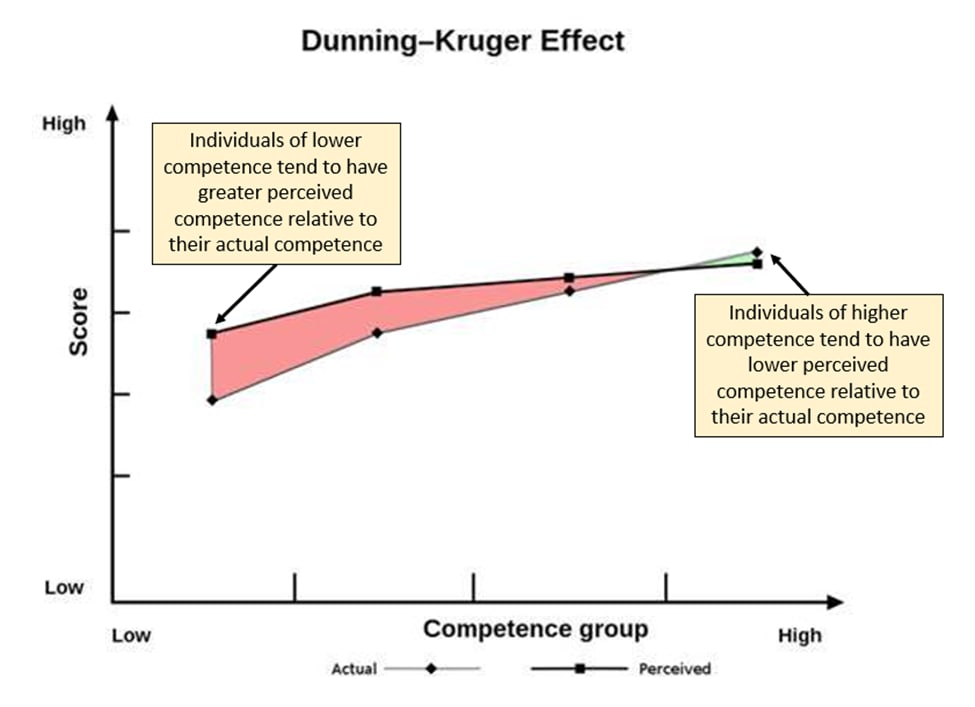
2.) Democracy Makes Neighbors Political Adversaries and Makes All Issues Political
A less considered shortcoming is the tendency for democracies to create adversity between citizens who hold differing political opinions. In the United States, this adversity has become so intense between Republicans and Democrats that distrust between members of opposing parties extends far beyond just political issues. Nearly every issue brought to the public eye, whether science, sports, movies, or music becomes irreversibly burdened with political interpretation, intention, and influence. Ideas and concerns submitted by one side of the political aisle are a priori rejected and condemned by the other side before the slightest consideration of the idea’s merits. This effect may be particularly amplified in a democratic political system where there are only two major parties. Then, nearly every political issue inherits a kind of adversity that is more likely to be absent when the number of available choices exceeds two.
The recent COVID-19 pandemic emphasizes the need to be aware of the tendency people have to view apolitical issues through partisan lenses. As thoughtful citizens we should be cognizant of this tendency when evaluating actions to take to solve these issues. A June 2020 article from FiveThirtyEight detailed the divergence of experiences between Republicans and Democrats during that time2. Republicans generally exhibited less concern about the pandemic while Democrats exhibited greater concern about it. The intent of this article is not to determine which political party was correct or incorrect about the pandemic, but to demonstrate how partisan politics played a crucial role in shaping people’s viewpoints about a major issue. One would presume that the pandemic should never have been a political issue. Instead, the pandemic and its mitigation efforts should have been matters of public health and science.
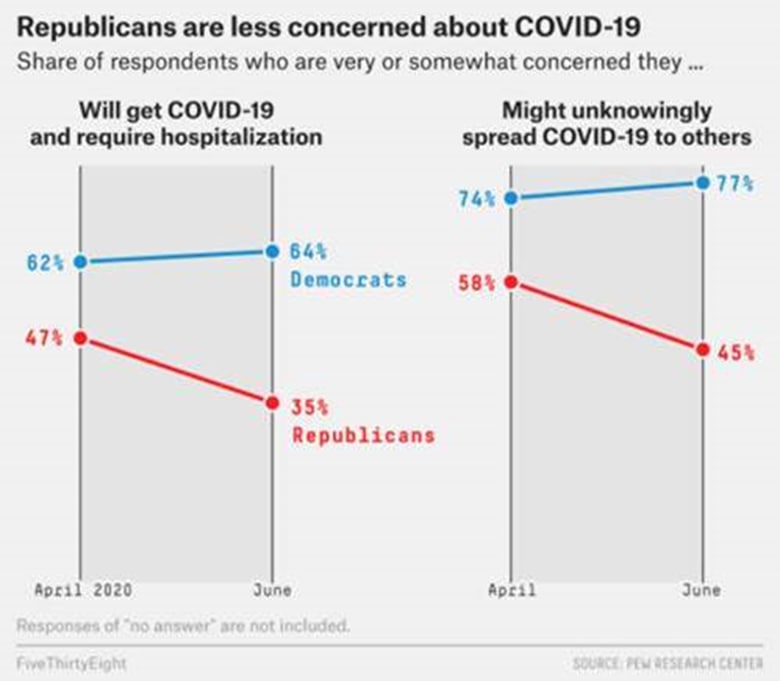
Ideally, an open scientific investigation and discussion should have been facilitated to find the best solutions to counter the pandemic while maintaining the minimum possible obstruction of freedoms upon citizens. Instead, political parties championed separate causes and blamed the opposition for any and all Covid-19 deaths. This turned the opposing party into literal “murderers” while one’s own party used these deaths to lobby for votes.
This is not to say that there were no valid issues that were brought up during the political chaos. Examples of valid points of disagreement included masking policies, vaccination mandates, lockdowns, and experimental drug treatments. However, actual open scientific debate on these issues was rarely carried out.
The COVID-19 pandemic response is just one example of where the political divide contaminates problem-solving and leads to further distrust between those that share different political opinions. As the political divide in America (and across the West) widens, more and more aspects of society become political, from sports to music to education. Nearly every aspect of life now contains political undertones, which only divides us further and makes cordial political dialogue near impossible. The U.S.’s current circumstance stands as an example of the tendency for democracies to politicize everything and divide its citizenry.
3.) Democracies Incur Great Opportunity Costs
Another drawback of modern democracy is the immense opportunity cost incurred by political campaigns. Time, money, energy, and attention are all consumed by political parties vying to ensure that their candidate is elected. Dozens, hundreds, and sometimes even thousands of people are employed for hours, days, and weeks to assist with a campaign on behalf of a candidate. And consider the fact that in a two-party system, one of these parties’ efforts will effectively be for nothing if it loses. Not only are political campaigns expensive, but they are also getting increasingly MORE expensive. In 2016 the total cost for presidential and congressional races was $7 billion. By 2020 that number doubled to more than $14.4 billion3.
Let’s consider what alternative investments could be made with $14.4 billion. For $400,000 each, $14.4 billion could buy 36,000 homes. Researchers from 23 countries suggest that $14 billion is the additional expenditure needed each year to eradicate world hunger by 2030. The National Cancer Institute estimates that the average cost of first-year cancer treatment is $42,000 4. At this price tag, $14 billion is enough to purchase a year’s worth of cancer treatment for over 330,000 people. Clearly, the extraordinary sums of money spent on political campaigns could be used for a variety of beneficial endeavors. These endeavors could have lasting, meaningful effects on the lives of countless people.
In addition to the monetary cost of campaigning, political involvement incurs a devastating mental toll on losers of election races. Regarding the 2016 presidential election, analysis suggests that in states that voted for Hillary Clinton in November 2016, there were a total of 54.6 million more days of poor mental health than in October 2016 5. Poor mental health leads to lower quality of life and lower productivity. Though poor mental health isn’t exclusive to democracies, it is a heavy opportunity cause to risk the mental health of half the country each election cycle. This problem is particularly strong in winner-take-all elections as in presidential races.
Another significant cost in democracies is the time and energy the politicians spent on campaigning and fundraising for the next election cycle. Not only must politicians work to enact new legislation, but they must also devote considerable resources to ensuring they maintain popular public opinion and are prepared financially for their upcoming reelection campaign. This diverts time, energy, and attention from passing legislation to lobbying voters and campaign donors. According to Rep. Rick Nolan in “60 Minutes” expose from CBS, members of Congress are encouraged to spend thirty hours per week in call centers for their respective parties asking for donations:
Rep. Rick Nolan: “Thirty hours is what they tell you you should spend. And it’s discouraging good people from running for public office. I could give you names of people who’ve said, “You know, I’d like to go to Washington and help fix problems, but I don’t want to go to Washington and become a mid-level telemarketer, dialing for dollars, for crying out loud.”
Interviewer: “You’re saying members of Congress are becoming like telemarketers?”
Rep. Rick Nolan: “Well, 30 hours a week, that’s a lot of telemarketing. Probably more than most telemarketers do.”
This emphasis on fundraising also results in fewer good people running for office according to Nolan – another opportunity cost of the current democratic process. 6
While political engagement is necessary for a functioning democracy, this engagement can incur a heavy cost on the people it purportedly serves. Current democracies risk turning politics into an industry unto itself. When the democratic process becomes an industry unto itself, it ceases to act on behalf of the people and instead serves the political actors.
4) Democracy is Expensive and Politicians Push Costs to Future Generations
The fourth flaw of democracy is the tendency for democracies to become more expensive over time as citizens vote for additional benefits from the government. Once a benefit is provided to citizens they will rarely vote to remove this benefit, especially when it is financed through tax dollars. This is particularly true when the benefit has been provided for several generations. Over time, this leads wealthy societies to become more dependent on the government to provide for the citizenry. Alexander Fraser Tytler, an influential professor of universal history in the 18th century and an expert on the rise and fall of civilizations summarized this tendency:
“A democracy cannot exist as a permanent form of government. It can only exist until the voters discover that they can vote themselves largesse from the public treasury. From that moment on, the majority always votes for the candidates promising the most benefits from the public treasury with the result that a democracy always collapses over loose fiscal policy, always followed by a dictatorship. The average age of the world’s greatest civilizations has been 200 years. These nations have progressed through this sequence: From bondage to spiritual faith; From spiritual faith to great courage; From courage to liberty; From liberty to abundance; From abundance to selfishness; From selfishness to apathy; From apathy to dependence; From dependence back into bondage.” 7
-Alexander Fraser Tytler
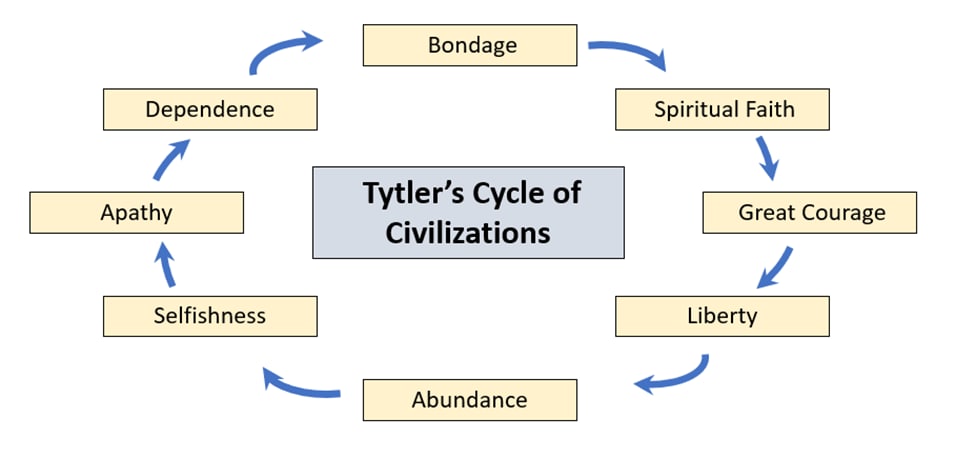
Tytler suggests that civilizations emerge out of hardship through great faith and courage. This struggle ultimately leads to liberty and abundance in which citizens are largely free to act as they see fit. But while desirable in their own right, liberty and abundance lead to selfishness and apathy when not tempered by discipline. Finally, when in a state of material wealth, a civilization returns to a state of dependence in which the citizenry chooses welfare and handouts over personal responsibility. This allows tyrants to exploit complacent citizens through false promises which leads to the final stage, the stage that defines most of human political history: bondage. Aristotle formulates Tytler’s cycle succinctly:
“Inevitably, masculine republics give way to feminine democracies, and feminine democracies invariably give way to tyranny.”
-Aristotle
And the prolific historian Will Durant summarized this phenomenon even more simply:
“A civilization is born Stoic and dies Epicurean.”
-Will Durant
This trend toward dependence is evident in the amount of debt a democratic nation accrues. Consider that nine of the ten most indebted nations are considered democracies by the World Population Review 8,9. Only the tiny Asian nation of Bhutan (considered a “hybrid regime”) is not considered either a flawed or full democracy. The graph below demonstrates that democracies are particularly prone to spending beyond their means. Debt is money borrowed from future generations to pay for the expenses of the current generation. By voting themselves benefit after benefit, citizens vote themselves into being financial liabilities. These liabilities are expected to be paid for by future generations, creating an unsustainable financial trajectory. As we have seen from Tytler’s cycle of civilizations, this unstable financial path can then be exploited by opportunists willing to bribe citizens with additional benefits in exchange for their freedom. This results in a reduction of liberty and prosperity in society.
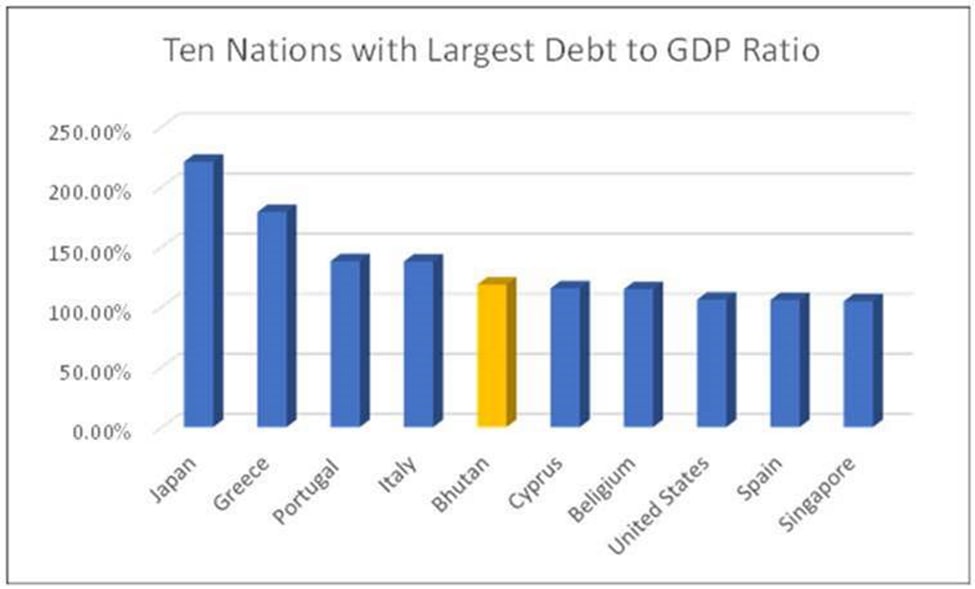
The politicians who make grand promises to their constituents rarely pay the cost incurred by said promises. Instead, future generations foot the bill for policies that were often passed simply to gain temporary public approval. Sly politicians prey upon the shortsightedness and emotionality of voting citizens, ultimately buying votes with hard-earned capital from future generations.
Conclusion
In conclusion, democracies come with flaws like all forms of government. Democracy’s tendency to reflect the vices of their citizenry and pit citizens against each other means that democratic nations should focus on the education and ethics of their populaces. Consequently, their voters can make informed and moral choices when selecting elected leaders. The high opportunity cost of political campaigns and the propensity for democracies to accrue large amounts of debt is also a serious flaw in democratic governments. Laws that limit campaign contributions and government spending constraints could mitigate these issues, though this is easier said than done. Voters and representatives alike will need to be cognizant of future generations when considering any increase in government benefits.
Overall, no form of government is perfect. It can be trendy to ridicule democratic government given the current state of the western world. However, let us refrain from unreflective and reckless criticism. Perhaps Winston Churchill’s wise assessment of the system is most appropriate:
“Democracy is the worst form of government, except for all the others.”
-Winston Churchill

Thinking West aims to revive the “Great Conversation” in our digital age through promoting the study of the great books of the western world, classical approaches to education, and through thoughtful commentary on current events, history, philosophy, culture, education, and religion.
We strive first and foremost to spark an appreciation for the values that built the West. Our content strives for depth and meaning in an era plagued by six second attention spans and clickbait headlines. We challenge ourselves and our readers to read, reflect, and speak out on ideas that matter.
Footnotes:
[1] https://onlinelibrary.wiley.com/doi/abs/10.1111/pops.12490
[3] https://www.opensecrets.org/news/2021/02/2020-cycle-cost-14p4-billion-doubling-16/
[6] https://www.cbsnews.com/news/60-minutes-are-members-of-congress-becoming-telemarketers/
[7] https://www.goodreads.com/quotes/108530-a-democracy-cannot-exist-as-a-permanent-form-of-government
[8] https://worldpopulationreview.com/country-rankings/democracy-countries
[9] https://www.stash.com/learn/10-countries-with-largest-national-debt-to-gdp/
Published in Bold Christian Writing
Sunday, 23 October 2022
The Fall Of Empires Putting All The Pieces Together
Putting All The Pieces Together
Authored by Simon Black via SovereignMan.com,
We start our podcast today more than 2,500 years ago at a time when the dominant superpower in the western world was the Achaemenid Empire of Persia.
Their civilization had reached an unfathomable level of wealth and sophistication; historical records show that, at peak, the Persian treasury had more than $300 BILLION in savings (in today’s money).
They had an intricate road network, a highly-functioning postal system, impressive engineering works, and had even invented a crude form of refrigeration and air conditioning.
Most of all they had a fearsome military. It was huge. And it was terrifying. Simply put, an invading Persian Army had never been defeated.
And yet, early in the 5th century BC, when they went to war against a rapidly rising power in Greece, the Persians suffered a humiliating defeat. Then again. And again. And again.
The losses changed the perception of their Empire forever.
Practically overnight their reputation sank, and they were no longer viewed as a terrifying superpower able to dominate the world.
We’ve seen this story over and over again throughout history, from Ancient Rome to the Mongols to Imperial Portugal in the early 1800s.
Simply put, dominant superpowers almost invariably have an equally dominant, fearsome military that inspires awe and intimidation in the rest of the world… and especially in the superpower’s adversaries.
But superpowers have a life cycle. They rise, peak, and decline. And at some point during the decline, the military begins to show signs of weakness.
Often times there’s some specific event– something happens that’s so humiliating to the superpower that it shocks the world.
This is what happened to the Persians in 490 BC. And it’s what happened to the United States in 2021.
As a West Point graduate and US Army veteran, I still hold in my heart that the US military is the finest fighting force on the planet.
But facts are facts, and the US military is showing clear signs of decline. Most of it is due to incomprehensible failures of leadership.
Today we discuss that decline; I reference a brand new report by the Heritage Foundation, its 2023 Index of US Military Strength, which provides an extremely honest (and distressing) analysis of the US military’s capabilities, capacity, and readiness.
The report spells out in nearly 600 pages of painstaking detail how the US military is rapidly losing (or has already lost) its technological advantages. It shows how there are not enough forces to defend American interests against a major adversary like China. And most importantly, the report concludes that the military is simply not ready.
These conclusions have far-reaching implications.
History has shown over and over again that once a superpower’s veneer of invincibility is pierced, it rapidly loses its status. And that’s even more true when another competing power is on the rise.
Loss of status as the world’s sole superpower goes far beyond reputation and military conflict.
The economic consequences are devastating.
That’s because dominant superpowers also tend to own the world’s primary reserve currency– in this case, the US dollar.
Being the world’s reserve currency means that commercial and financial transactions around the world are conducted primarily in US dollars.
So for example, a Brazilian merchant and its supplier in India do business with each other in US dollars. Futures contracts for gold, copper, crude oil, etc. that are traded in foreign commodities exchanges (like the Dubai Gold & Commodities Exchange) are denominated in US dollars.
The dollar is so dominant that when Airbus (a European aircraft manufacturer) sells its jets to European airlines, they typically close those deals using US dollars instead of euros. And giant European companies (like Nestle, BP, and Volkswagen Group) issue corporate bonds in US dollars.
You get the idea.
All of these USD financial and business transactions around the world mean that foreign investors, corporations, governments, and banks HAVE to stockpile US dollars, simply because the dollar is the global reserve currency.
And foreign institutions tend to hold the majority of their dollar assets in US government bonds (which is the largest and most liquid USD asset class in the world).
In total, foreigners collectively own $7.5 trillion worth of US government bonds, equivalent to 25% of the national debt… because they HAVE to own the world’s reserve currency.
This allows the US government to get away with the financial equivalent of murder.
The US government can run outrageous budget deficits, fund endless wars, and pay people to NOT work… and foreigners will still hold US dollars and buy US government bonds.
But this unparalleled privilege would dry up very quickly if the US dollar loses its status as the world’s dominant reserve currency.
I wrote about this briefly earlier in the week. But in today’s podcast, we put all the pieces together.
Specifically, I show you how US military dominance is linked to US superpower status… and the US dollar’s position as the world’s reserve currency.
We look at the lessons from history to examine the trajectory of a superpower in decline. And we try to connect the dots to see where our currency trajectory will lead us.
This fate is not necessarily imminent; strong leadership and better performance from government could arrest the decline.
Unfortunately, the US government seems completely incapable of solving problems.
Their entire approach to problems, in fact, is very cyclical. It goes something like this:
1) The government does something stupid that creates a problem.
2) They ignore the problem they just created and let it fester.
3) When the problem becomes obvious, they offer a symbolic gesture– ‘thoughts and prayers’
4) When the problem becomes so extreme, they panic and do “whatever it takes”
5) “Whatever it takes” is reckless, expensive, and usually destructive, causing the cycle to start over again.
We cover all of this, and more, in today’s episode, which you can download here, or access in iTunes and Spotify...
Ancient Artifacts Prove Human Genetic Destruction by Satan
Ancient Artifacts Prove Human Genetic Destruction by Satan – Steve Quayle
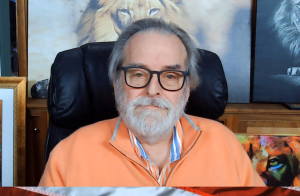 By Greg Hunter’s USAWatchdog.com (Saturday Post)
By Greg Hunter’s USAWatchdog.com (Saturday Post)
Renowned radio host, filmmaker and book author Steve Quayle says evil satanic globalists want you to believe there is no God the Father and no Jesus the Son. Instead, they want you to believe that aliens made humankind. Quayle, who is privately funding expeditions to dig up artifacts thousands of years old, says the narrative that aliens created humans is a huge lie. Quayle and his team have recently dug up ancient Egyptian artifacts from Mexico and Central America to prove his point. Quayle says, “I want to share this. There are 27 forms of incredibly ugly creatures. We have panels and photographs that others have excavated in the late 1950’s that show the aliens sexually encountering human females and giving birth to some ‘its.’ In no place is there any indication that the aliens created humans, but there is every indication they messed with the DNA. . . . We have found in the language that they have translated (from the ancient artifacts the Quayle team has found) . . . and the overwhelming concern the amount of genetic tampering from creatures we found polluting the human genome. This is interesting because if you flash forward to where we are at now with the Messenger RNA vaccines and the transformation of the human genome, when do you have so much tampering that you are no longer human? . . . The Biblical Luciferian takeover of the Earth translates into the Tribulation period, and during that Tribulation period, the number one goal of the fallen angels and their controller, which would be Lucifer, is to basically destroy all humanity. That’s why Jesus said if God did not shorten the days for the elect sake, the righteous, those who believe in Jesus, there would be no flesh left alive. That’s where the whole transhumanism argument comes in.”
Quayle also says, “When you look at the artifacts that are coming out of Mexico and Central America, we can look at the absolute evidence of the genetic tampering by aliens. . . . It is my contention that the fallen angels are the ones that tried to generate species apart from God that we see in the myths and legends of the world. . . . Jesus said the gates of hell are going to open. . . . When God created us, he created us with his miraculous genius, and the devil hates the image of man more than anything. I’ll tell you why, human beings can be redeemed.”
In closing, Quayle says, “We are at this point in history where the cover up and cover over people are keeping the ‘aliens made us narrative’ under wraps until the day comes where they hoist this on the world and say forget this Christian and God stuff. This is who created us . . .and that’s a lie.”
There is much more in the 55-minute interview.
Join Greg Hunter as he talks to radio host, filmmaker and top selling author Steve Quayle as he talks about his upcoming conference “The Egyptian & Alien Connections in the Americas” for 10/22/22.
(To Donate to USAWatchdog.com Click Here)
After the Interview:
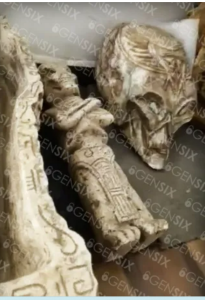 There is free information on SteveQuayle.com.
There is free information on SteveQuayle.com.
To see the free “The Egyptian & Alien Connections in the Americas” trailer, click here.
To sign up for the late November conference called “The Egyptian & Alien Connections in the Americas,” click here. It will include a 4-hour documentary on the artifact digs in Mexico and Central America.
To find out more about the “ISatPhone2” satellite phone or the Bivy Stick from Satellite Phone Store, click here.

